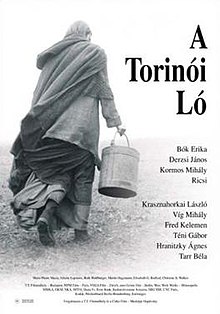The Turin Horse
| The Turin Horse | |
|---|---|

Theatrical release poster
|
|
| Directed by |
Béla Tarr Ágnes Hranitzky |
| Produced by | Gábor Téni |
| Written by |
László Krasznahorkai Béla Tarr |
| Starring |
János Derzsi Erika Bók Mihály Kormos |
| Narrated by | Mihály Ráday |
| Music by | Mihály Víg |
| Cinematography | Fred Kelemen |
| Edited by | Ágnes Hranitzky |
|
Production
company |
T. T. Filmműhely
|
| Distributed by | Másképp Alapítvány Cirko Film; The Cinema Guild (U.S.A.) |
|
Release date
|
|
|
Running time
|
146 minutes |
| Country | Hungary |
| Language | Hungarian |
The Turin Horse (Hungarian: A torinói ló) is a 2011 Hungarian philosophical drama film directed by Béla Tarr and Ágnes Hranitzky, starring János Derzsi, Erika Bók and Mihály Kormos. It was co-written by Tarr and his frequent collaborator László Krasznahorkai. It recalls the whipping of a horse in the Italian city Turin which is rumoured to have caused the mental breakdown of philosopher Friedrich Nietzsche. The film is in black-and-white, shot in only 30 long takes by Tarr's regular cameraman Fred Kelemen, and depicts the repetitive daily lives of the horse-owner and his daughter.
The film was an international co-production led by the Hungarian company T. T. Filmműhely. Tarr announced then that it was to be his last film. After having been postponed several times, it premiered in 2011 at the 61st Berlin International Film Festival, where it received the Jury Grand Prix. The Hungarian release was postponed after the director had criticised the country's government in an interview.
The Turin Horse opened to general acclaim from film critics.
"In Turin on 3rd January, 1889, Friedrich Nietzsche steps out of the doorway of number six, Via Carlo Alberto. Not far from him, the driver of a hansom cab is having trouble with a stubborn horse. Despite all his urging, the horse refuses to move, whereupon the driver loses his patience and takes his whip to it. Nietzsche comes up to the throng and puts an end to the brutal scene, throwing his arms around the horse’s neck, sobbing. His landlord takes him home, he lies motionless and silent for two days on a divan until he mutters the obligatory last words, 'Mutter, ich bin dumm!' ['Mother, I am stupid!' in German] and lives for another ten years, silent and demented, cared for by his mother and sisters. We do not know what happened to the horse."
...
Wikipedia
